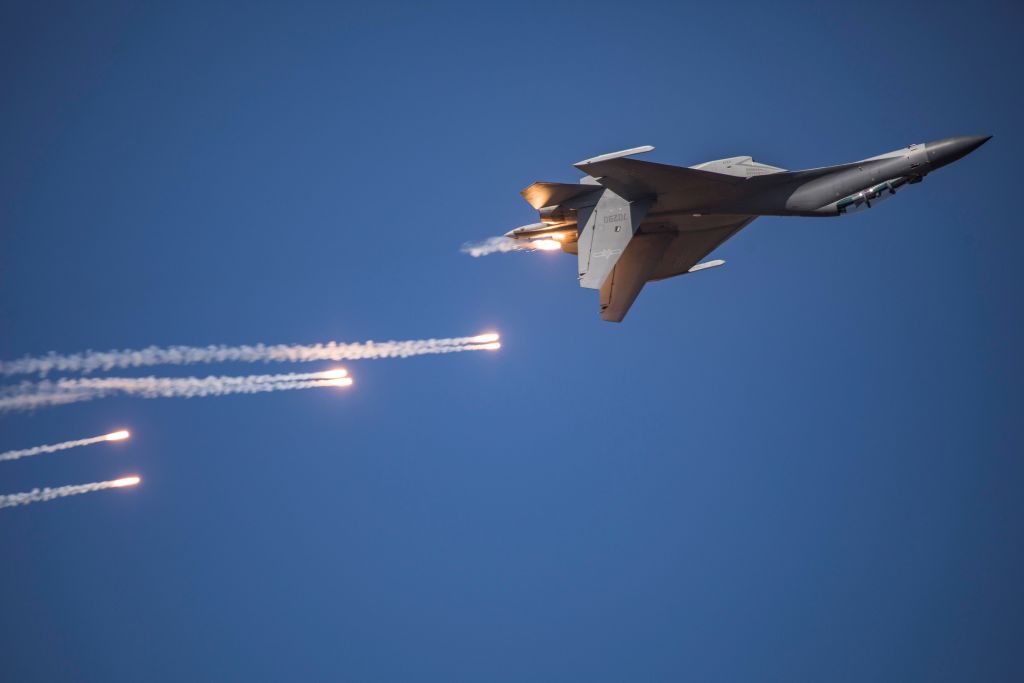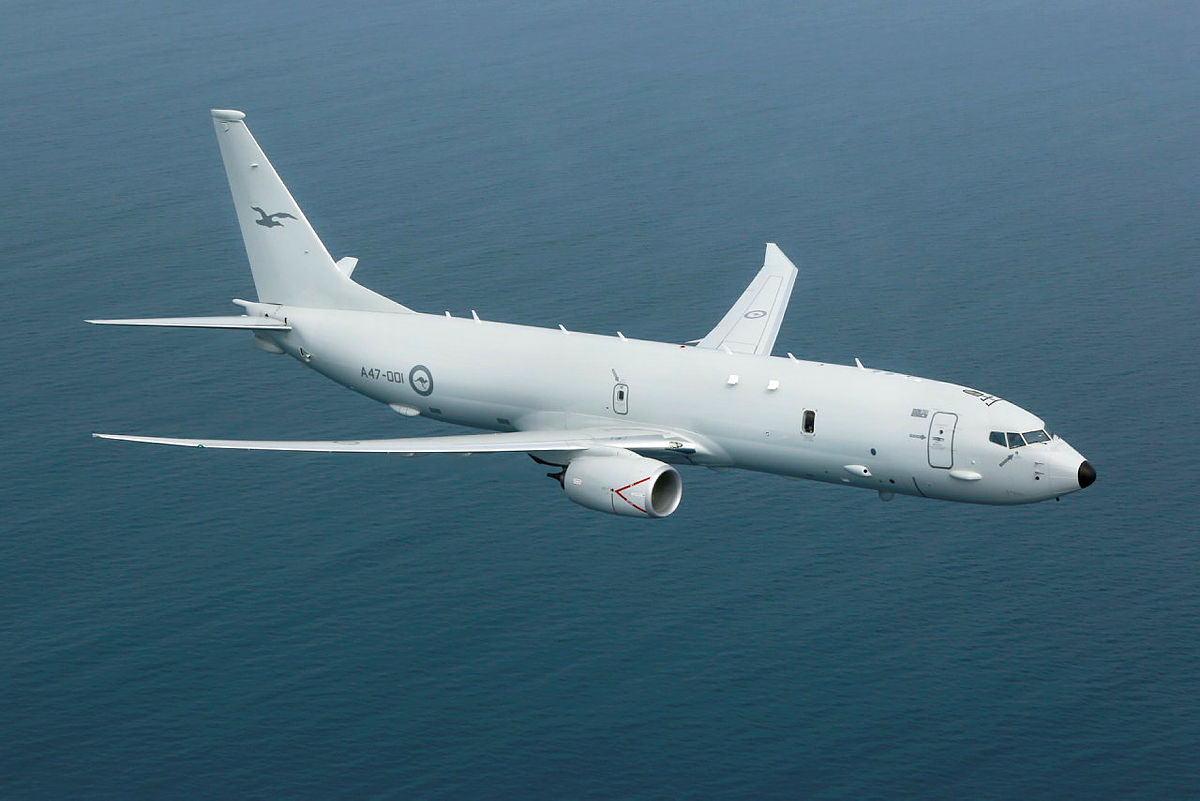
The 26 May incident where a Chinese fighter aircraft fired flares and chaff at an Australian maritime patrol aircraft in international airspace above the South China Sea, risking a potentially fatal crash, is not an isolated episode. And it’s not peculiar to the Australia–China relationship, so it would be wrong to see it as all about us and connected with any notion that Beijing is focusing much effort on a positive ‘reset’ of our bilateral relationship.
Instead, this type of aggression is the face the People’s Liberation Army is showing to numerous nations and in more places as its power-projection ability grows. It’s doing what Xi Jinping wants from it in his ‘new era’ of a Sino-centred world, controlled by the CCP.
On several occasions including on the same day as the incident with the Australian jet, Chinese fighter aircraft aggressively and dangerously harassed a Canadian military aircraft enforcing United Nations sanctions along the border with North Korea. As the Canadian government stated after the incidents, the PLA Air Force aircraft ‘did not adhere to international air safety norms’. It added ‘These interactions are unprofessional and/or put the safety of our Royal Canadian Air Force personnel at risk.’
On 24 May, Chinese bombers flew a joint patrol with Russian bombers over the sea of Japan and East China Sea to add military tension to the Quad leaders’ meeting happening in Tokyo.
The problem is that Xi has instructed his military to operate this way. He seems to want to make the PLA such a risky, dangerous entity to approach, that other forces will give it a wide berth for their own and the PLA’s safety.
It’s reminding many of the 2001 incident when a Chinese fighter collided with a US EP-3C Orion surveillance aircraft and damaged it so badly that it had to make a forced landing on Hainan Island. The Chinese pilot died. Now we have prospect of this happening on any day of the week to a number of nations’ military aircraft and ships who encounter Xi’s PLA. The PLA risks its own losses in these encounters also.
The Chinese military is acting under Xi Jinping’s instructions to be ‘primed to fight at any second’. The PLA is comfortable using force during peacetime, and even has a term for this: ‘peacetime confrontational military operations’. So, the Canadian and Australian examples are not local Chinese commanders or even individual pilots acting on their own. They are doing what Xi and the PLA high command want and expect.
This direction is why Chinese foreign ministry officials routinely deny documented aggression by their military and blame others in egregious statements along the lines of: ‘[relevant country] should respect the efforts made by China and ASEAN countries to maintain peace and stability in the South China Sea, instead of frequently sending vessels and aircraft to the South China Sea’.
True to form, the state media mouthpiece, the Global Times, has done just this in an article headed ‘PLA aircraft deal with Canadian, Australian provocative close-in recon in East and South China Seas’. Apparently, ‘by accusing the Chinese warplanes of threatening flight safety, the two members of the Five Eyes complained first while being the ones who are guilty in the first place’.
The Chinese government can’t mention that China has no legitimacy to its expansive claim to the South China Sea, because its arguments were comprehensively rejected by a 2016 ruling in a case the Philippines brought against it, based on the international law China helped draft and then signed up to—the UN Convention on the Law of the Sea. So, its warplanes were enforcing rights China does not have in international airspace where every nation has the right to operate without harassment.
And the Global Times didn’t mention the UN mission that the Canadians were performing along the North Korean border, because it would be too uncomfortable to note that China is a party to the sanctions and so should actually be assisting with their enforcement, not risking the lives of its own pilots and Canadian aircrew to prevent that from happening.

There are some particularly dangerous features of what the PLA J-16 did during its close encounter with the Australian P8-A Poseidon. Letting off flares close to the Royal Australian Air Force aircraft is one of those.
But the fact that the Chinese J-16 pilot flew close in front of the P-8 and fired chaff back towards the P-8 while manoeuvring dangerously is more than disturbing. Chaff and flares are used to distract missiles fired at planes, so the PLA pilot had no legitimate reason to do this. Depending on what the PLA’s decoy systems are composed of and how much material gets ingested (neither is clear), this could damage the aircraft’s engines and cause it to crash. Certainly, the combination of flares, chaff and close-proximity dangerous flying risks a mid-air collision and crash. The PLA pilot would have known this, so it is deliberate aggression and an escalation from the Chinese military.
Of course, if Beijing was at all serious about any positive ‘resetting’ of its relationship with Australia, it could have instructed its military to refrain from such hostility. But it hasn’t. Its rhetoric of resetting is all about seeking policy change in Canberra and allowing Beijing to dictate both what it wants from Australia and what we have to do to achieve that.
Beijing could also apologise to Australia and Canada and discipline the PLA pilots involved and their commanders. But no one who’s watched how Xi has stoked violent nationalism, turned his diplomats into ‘wolf warriors’ and let violent voices shout online for the Ukrainian people to die to deliver Vladimir Putin victory in his horrific war can expect to see this from Beijing.
These latest acts of PLA aggression should be seen in that light. It’s Beijing saying the world—not just Australia and Canada—now must live with how the Chinese leadership chooses to use its military power. It’s trying to normalise its behaviour and force others to adjust in response.
Sophistication and nuance is not something Xi and his officials and military are practising. Instead, hard power, assertion, coercion, aggression and denial are the primary characteristics of Xi’s ‘new era’. In this era, Russia is China’s ‘no limits’ partner in aggression, as shown by the joint bomber flights.
No nation dealing with Beijing’s assertion of military power should feel lonely or allow China to isolate it in bilateral discussions. The broad, united approach to facing down Putin in his horrific war must be applied to the China–Russia strategic partnership.
There’s also a connection between these potentially deadly military acts by China and the future of the South Pacific.
How glad the 10 nations who didn’t sign Beijing’s proposed regional security pact must be that they rejected this offer. The Canadian and Australian incidents, together with the joint Russian-Chinese bomber mission are graphic demonstrations of why enabling the Chinese military to operate more routinely and easily in the South Pacific—as Beijing wants and as Solomon Islands Prime Minister Manasseh Sogavare is helping happen—is bad news for South Pacific nations.
This is ‘security assistance’ the PLA way.

